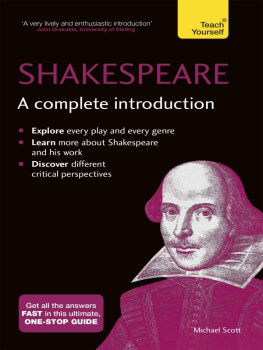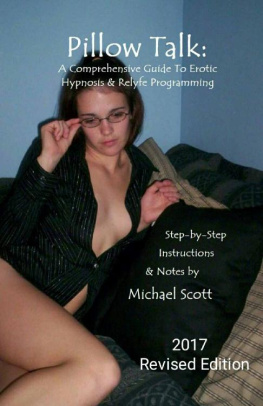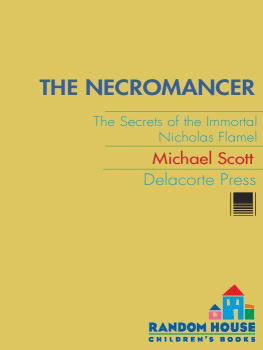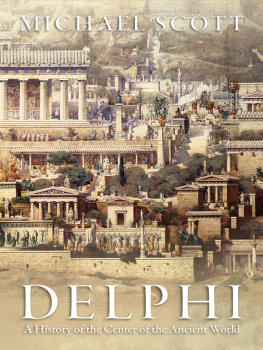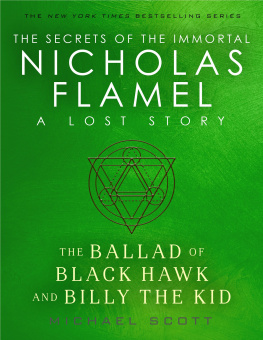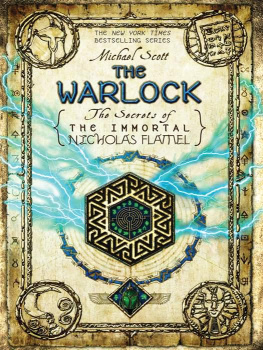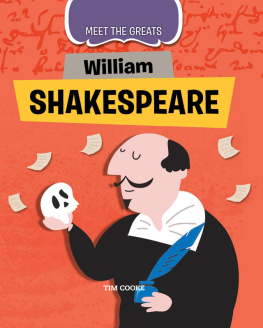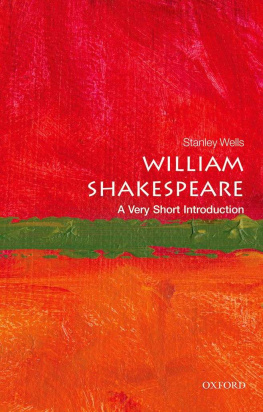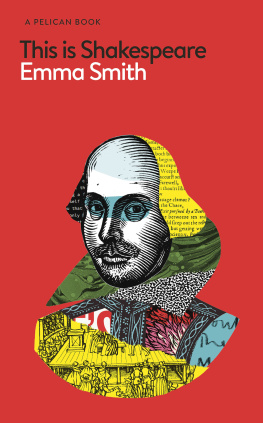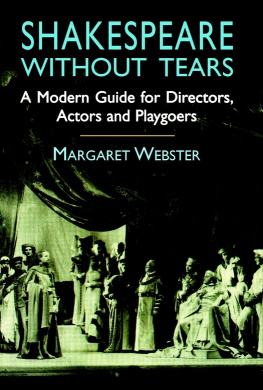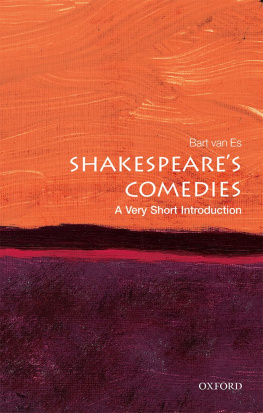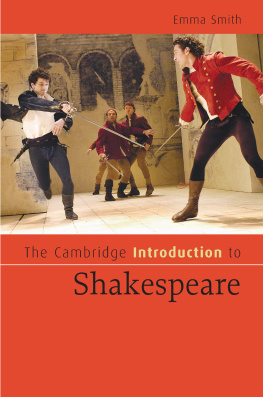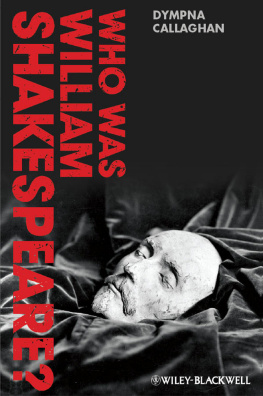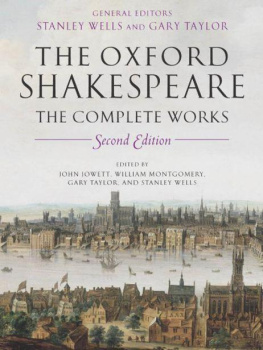Shakespeare:
A Complete Introduction
Michael Scott
To the family
Acknowledgements
This book could not have been written, produced or published without the help and support of my wife, Eirlys, who worked tirelessly on it with me from its inception, but who sadly died before its publication. My thanks are incalculable, my love immeasurable. She wanted the book to be dedicated to the family. I wish it also to serve as a tribute to her memory and to her love for us all.
My thanks to Professor John Drakakis, friend and colleague, who has diligently read through the typescript, making suggestions and comments which I have invariably included. Thanks also to Terry Hands, former Artistic Director of the Royal Shakespeare Company and subsequently of Clwyd Theatre Cymru, a good friend with whom Ive discussed elements of this book and who has inspired generations of theatregoers.
I am grateful to my publisher and editor, Victoria Roddam, for her professionalism, guidance and timely notes of encouragement through the writing period, and to my project manager, Sarah Chapman, and my literary agent, Charlotte Howard at Fox and Howard Ltd, for their advice and support.
I owe a debt of gratitude to all my teachers and colleagues at the various universities at which Ive studied or taught and to those teachers and members of my family who in my schooldays gave me my first insight into the joy of Shakespearean performance and study. Too many are, sadly, now long gone but will never be forgotten. Thanks also to Medwin Hughes, Vice Chancellor of University of Wales Trinity St David for his support and encouragement. I am grateful as always to my daughters, sons-in-law and grandchildren for the joy they give us as a family, which encourages the writing.
Finally, I acknowledge with gratitude all those writers and scholars referenced and/or quoted in this book and, of course, the students I have been privileged to teach, both in the UK and abroad.
Contents
Preface
Shakespeare wrote for everyone, whoever they were, from Queen or King to the most menial, and all came to see the plays. He is as comprehensive in his entertainment as he is in his audiences. For years, certain factions in society have tried to claim him for themselves and in so doing have deterred others, perhaps even you, from appreciating and enjoying his work. This book wishes to set him free for everyone to enjoy. It aims to introduce and explain the plays by looking at how they work, taking you on a journey through the genres of comedy, history and tragedy. It is the process of this journey, with its various landmarks, which is the books purpose.
We will also consider various critical perspectives that will help you clarify various movements or issues concerning Shakespeares work that we will meet along the way. Broad definitions of various critical movements, for example, can be found in . Obviously, as with any guide, I have to be selective. Each of Shakespeares plays is mentioned but we will spend more time discussing the best known and popular of the plays. Nevertheless, even plays in which Shakespeare may have had only the briefest creative and collaborative interest as a writer, get at least a mention, as do the poems, although I do not dwell on them in any detail.
There are plenty of good biographies of Shakespeare, and I spend a little time identifying some of the more recent ones but, throughout our journey, aspects of his life are referenced in the discussion. The book follows a logical framework, on which I comment in the conclusion, but Ive taken care, I hope, to enable you to dip in and out of various chapters as you wish and to provide you with a wide range of references.
Hodder & Stoughton invited me to write this book following the publication of Shakespeares Comedies (2014) and Shakespeares Tragedies (2015), which I wrote for its All That Matters series. I draw on material from those books in some of the chapters. That being said, lets stiffen the sinews and begin.
Michael Scott
A NOTE ON THE REFERENCES
Unless otherwise stated, the text used for all quotations and references to acts, scenes and lines is The Arden Shakespeare Complete Works edited by Richard Proudfoot, Ann Thompson and David Scott Kastan, reissued edition 2011, paperback (London: Bloomsbury Methuen Drama).
Releasing Shakespeare
William Shakespeare has been hailed as one of the greatest thinkers of all time, one of the worlds finest artists, poets and dramatists. His plays are discussed in the context of their language, philosophy and meaning. Nowadays people study them and are assessed on his work in examinations. So intense has the Shakespeare industry become that, in any single year, there are probably more words written about him or spoken of him than he wrote himself. He is a complex phenomenon that can cause us problems as we approach his work, whether on the page or the stage.
When we put this prodigious reputation together with the distance of four hundred years since Shakespeare died, we need to remember that there have been major changes in language, social values and perceptions. The medium of poetry in which much of the drama is written reflects the verbally dominant styles of communication and entertainment of his time that have become primarily visual today. In view of the vast amount of scholarship about the man and his work and an apparent elitist culture that has grown up around him, it is no wonder that some people approach his plays with trepidation.
Shakespeare the entertainer
Shakespeare was in the entertainment business. He made his living mainly from writing and acting in plays. He was so successful that he became a sharer in his company, the Lord Chamberlains Men, and in their theatre, the Globe. The company name indicated that the Lord Chamberlain was the patron of the company. Without having a patron it was against the law to act in plays professionally, but this did not mean that the Lord Chamberlain actually subsidized the company. Through his name the actors were protected; without it they could have been prosecuted as vagabonds and vagrants.
all Fencers Bearewardes Comon Players in Enterludes & Minstrels, not belonging to any Baron of this Realme or towardes any other honourable Personage of greater Degeree; all Juglers Pedlars Tynkers and Petye Chapmen;[who] shall wander abroade and have not Lycense of two Justices of the Peace at the least,shal bee taken adjudged and deemed Roges Vacaboundes and Sturdy Beggers.
Act for the Punishment of Vagabonds 1572 (quoted in Gurr, A. [1970: 19], The Shakespearean Stage, 15741642. Cambridge: Cambridge University Press
The Globe Theatre was not the first theatre where the Lord Chamberlains Men acted or for which Shakespeare first wrote plays; that playhouse was The Theatre, situated north of the city of London. The lease for that playhouse ran out in 1597, so for the following year the company played at the neighbouring theatre, the Curtain, before moving to the Globe, which opened in 1599. The actors had to run their theatre and company as a commercial concern. Later, Shakespeare took a business interest in a further smaller indoor theatre, the Blackfriars, where the company could perform in winter. After the accession in 1603 of James VI of Scotland to the English throne as James I, the King became the patron of the company, which then became known as the Kings Men.

